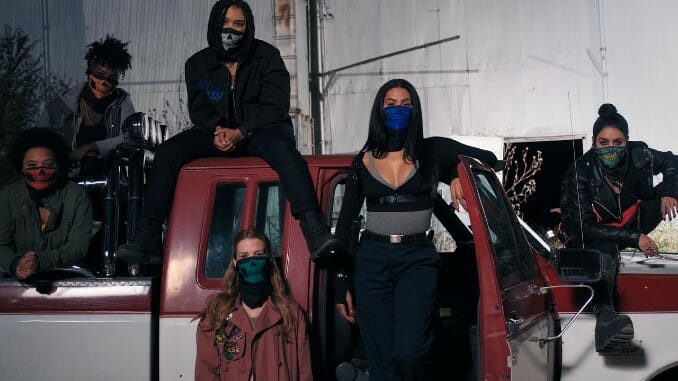Asking for It Is the Most Inept #MeToo Movie Yet

Is this movie a psy-op? The #MeToo revenge thriller Asking for It seems custom-built to inspire gratitude for Promising Young Woman—or virtually any other movie that might otherwise miss its sociopolitical-thriller mark. Promising Young Woman may have been overly tidy and arch, but it was made with an exacting sense of purpose. Asking for It is made with sloppy overconfidence, a stunning bluff of both style and substance.
Joey (Kiersey Clemons), a vaguely college-aged woman living with her grandparents and working as a waitress in her home town, reconnects with her old friend Mike (Casey Cott), and after a pleasant, flirtatious sort-of date at a party, he rapes her. Wandering through the aftermath in a traumatized daze, Joey is befriended by Regina (Alexandra Shipp), who introduces her to a posse of angry young women who rebel against the myriad abuses of the patriarchy. Eventually, they all go on the road together, targeting a gathering organized by men’s rights activist Mark Vanderhill (Ezra Miller).
The story sounds simple and starts tripping over itself almost immediately. Following a ragged opening montage of Vanderhill’s unhinged rants that establishes Asking for It’s overkill-and-keep-killing techniques, the timeline starts to distend in odd directions: 10 minutes into the movie, before Clemons has any chance to get her footing, Joey is already sleepwalking through her upended life because of her sexual assault; half an hour after that, the movie is somehow still clearing its throat. Rather than focus on the rueful camaraderie between Joey, Regina and the edgier Beatrice (Vanessa Hudgens), writer/director Eamon O’Rourke keeps adding new characters who don’t do or even say much of anything. It might not be entirely fair to suggest that a white male filmmaker is haphazardly checking boxes as he brings a middle-aged den mother (Radha Mitchell), a trans woman (Lenya Bloom) and a solemn Native woman (Casey Camp-Horinek) into the fold, but when the film can barely account for their whereabouts, much less assign them personality traits, the mind wanders. Does the screenplay see any of these women as people? Or does O’Rourke just enjoy flashing character names on-screen like a Tarantino knock-off, then patting himself on the back for his inclusiveness?
-

-

-

-

-

-

-

-

-

-

-

-

-

-

-

-

-

-

-

-

-

-

-

-

-

-

-

-

-

-

-

-

-

-

-

-

-

-

-

-








































